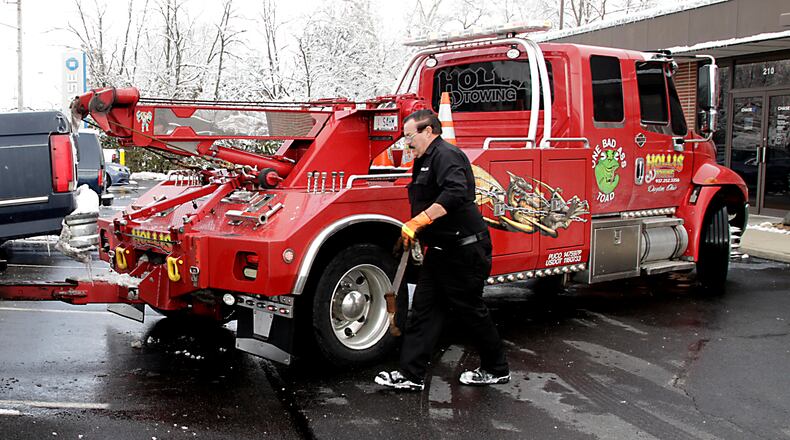New towing law:
• Requires a towing service to provide notice to the owner or operator of a vehicle who arrives after the vehicle is prepared for towing of the option to pay a “drop fee,” or one half the towing charge for release of the vehicle.
• Requires a towing service, before hauling a vehicle from a private tow zone, to take photos to show the violation.
•Allows vehicle owners to retrieve personal items with presentation of proof of ownership without retrieving the motor vehicle and without paying a fee - unless the vehicle is involved in a criminal investigation.
• Gives Public Utility Commission of Ohio authority to set tow fees.
• Tow truck operators who violate rules could be fined.
• Allows vehicle owners to bring civil lawsuits against tow operators who violate the law.
Source: Ohio Legislative Service Commission.
LATEST NEWS
Ohio lawmakers have passed several laws in recent weeks, including changes regulating towing services. Follow our political coverage on Twitter at @Ohio_Politics.
Ohio’s tow truck operators will be rolling under a lengthy set of new regulations in 2015, rules aimed at giving owners of towed vehicles more rights.
Among other consumer protections, the legislation requires towing firms to let vehicle owners remove personal property from their vehicles without charge.
It also requires truck operators to tell owners who arrive at the scene during the hook up that they can pay half a tow charge to have the vehicle released. Tow truck drivers would have to take photos to show a vehicle was in violation.
Complaints about abusive towing practices are common enough, according to records on file with the Ohio Attorney General’s Office.
Over the past two years, the office recorded 136 towing-related complaints — a dozen from Miami Valley counties. The local complaints ranged from damage to a vehicle to not getting a receipt for surrendering a vehicle to a tow company.
Chris Besecker, 24, a senior at Wright State University, complained about two visiting friends who were blocked in by a tow truck driver when they tried to leave Besecker’s Fairborn apartment complex.
The driver demanded $70 each because, he told them, they were in a part of the lot reserved for residents with parking tags. The two ended up paying on the spot. Only a limited number of spaces were reserved for visitors, and Besecker said he understood that visitors could park in other parts of the lot when the spaces filled.
After complaining to the apartment complex owners, Besecker said the charges were refunded by a reduction in his rent. He then reimbursed his friends.
“I know it happens a lot on college campuses. It’s predatory — they just drive around looking for it. They shouldn’t be able to do that,” he said.
Towing company Cottman’s Towing of Dayton said it fired the driver involved in the incident — and others, too, who violated company policy. Cottman’s owner Richie Turner said the trucks were in the lot under an agreement with the apartment property owner who requested regular visits, but the drivers weren’t following their training.
“I had a few drivers who tried to block people in, and they have been terminated,” he said. “You train people, and then they start doing it their way. Every business has employees that try to do things their way, and they get terminated.”
Overall, Turner said he’s in favor of the new regulations.
Roger Kimmel, 55, of Carlisle, had what should have been a minor problem — getting a receipt for surrendering his daughter’s wrecked car to the tow company. He needed the receipt to recover a tow charge from AAA.
“They got a little hostile with me, and that got me annoyed,” he said of the company. The complaint to the attorney general did get him his receipt, and AAA refund, he said.
Terry Fleming, lobbyist for the Towing and Recovery Association of Ohio, said the law changes are costly. For example, parking lot signs to warn people that their vehicles could be towed will have to be updated. He said tow truck operators aren’t appreciated enough by the public.
“They are like lawyers and police. Everyone hates them until you need them. They provide a helluva service. It’s a dangerous business out there on the road,” he said.
About the Author
